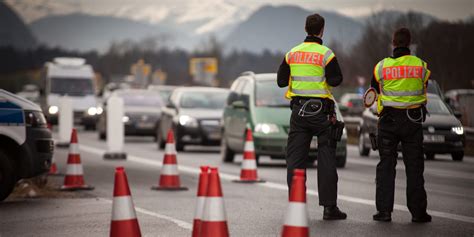With the start of this year's European men's soccer championship, temporary border controls were introduced at the German borders on the grounds of a particular risk situation. The CDU/CSU and the FDP are now calling for these controls to be continued after the end of the European Championships.
On the issue of border controls, there appears to be unity between the opposition CDU/CSU and the FDP, which is part of the government. Bijan Djir-Sara, General Secretary of the FDP, was one of the first politicians to speak out at the end of June and called for the controls to be continued in the long term. As a result, other colleagues from his party backed his demands. The CDU/CSU also saw an opportunity to take advantage of these demands and joined the FDP in calling for permanent border controls.
The reasoning behind this is, on the one hand, the results of the EM-related border controls. These look quite successful. Since the start of the European Championships, the Federal Police have deployed 22,000 officers at the borders every day. Between June 7 and 27, these police officers executed around 600 outstanding arrest warrants and made provisional arrests of around 150 so-called people smugglers. Migrants who were not allowed to enter the country were also turned away by the police at the borders. "Entry-preventing measures" were carried out in around 3,200 cases. Around 100 known soccer hooligans were also prevented from entering germany.
With these numbers, it is quite understandable that the leading politicians are seeing these police activities at the borders as a success. Even if there seems to be unity within the various parties in the state apparatus on the question of evaluation, there are contradictions to the demands to continue border controls permanently. While the CDU/CSU and FDP seem to be in favor of continuing the controls, the SPD and the Greens are against it. Interior Minister Faeser also recently issued a clear rejection of this demand. Some of the arguments put forward for the rejection of border controls are that they would have serious consequences for travelers, commuters and, not least, trade. The police union (GdP) is also getting involved and sees the debate as an opportunity to possibly make more money in the future. It states that permanent extensive checks at the borders would not be feasible at the present time, as the police would not have enough staff and equipment for this and would need more money.
However, the key reason for opposing the continuation of border controls is the question of EU law. In her rejection of the demand, Faeser states that those who call for the continuation of border controls should also explain "how this is in line with European law". Thie European law is the crux of the matter, because the Schengen Agreement states that no permanent border controls with other EU countries may take place within the EU. It is established that every citizen of the European Union can freely and easily cross the internal borders of the Union, and complete border controls such as those that took place during the European Championships may only take place in situations in which there is a serious threat to public order or internal security and only be allowed to take place temporarily, for a limited period of time.
Interior Minister Faeser is therefore referring to an important aspect of European law, which is incompatible with the demand for guarded borders. As Minister of the Interior, she is of course aware of this aspect of EU law, but the Schengen Agreement should not be an unknown mystery even for the CDU/CSU, which is currently in opposition, and the FDP, which occasionally presents itself as the opposition within the government.
News and newspapers report on this debate for a few days, speeches are made, various politicians comment on it, but in the end it is all smoke and mirrors. That "situation" is a good example of how bourgeois politics works. The leading politicians of the bourgeois parties are usually not "Perpetrators of conviction" but careerists who direct all their actions to their own advantage. Even if they themselves are not convinced of the correctness of their demands and implementations.
Picture source: ADAC.de











